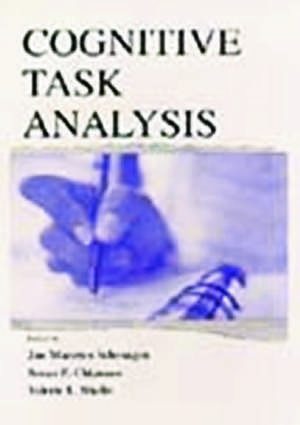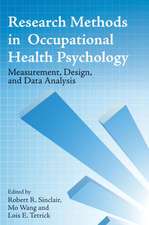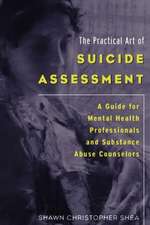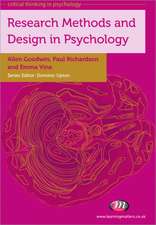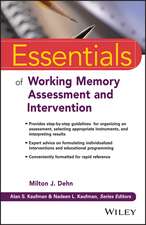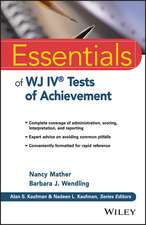Cognitive Task Analysis: Expertise: Research and Applications Series
Editat de Jan Maarten Schraagen, Susan F. Chipman, Valerie L. Shalinen Limba Engleză Hardback – iun 2000
The editors' goal in this book is to present in a single source a comprehensive, in-depth introduction to the field of cognitive task analysis. They have attempted to include as many examples as possible in the book, making it highly suitable for those wishing to undertake a cognitive task analysis themselves. The book also contains a historical introduction to the field and an annotated bibliography, making it an excellent guide to additional resources.
Preț: 910.46 lei
Preț vechi: 1110.31 lei
-18% Nou
Puncte Express: 1366
Preț estimativ în valută:
174.27€ • 189.36$ • 146.48£
174.27€ • 189.36$ • 146.48£
Carte tipărită la comandă
Livrare economică 22 aprilie-06 mai
Preluare comenzi: 021 569.72.76
Specificații
ISBN-13: 9780805833836
ISBN-10: 0805833838
Pagini: 548
Dimensiuni: 152 x 229 x 41 mm
Greutate: 1 kg
Ediția:New.
Editura: Taylor & Francis
Colecția Psychology Press
Seria Expertise: Research and Applications Series
Locul publicării:Oxford, United Kingdom
ISBN-10: 0805833838
Pagini: 548
Dimensiuni: 152 x 229 x 41 mm
Greutate: 1 kg
Ediția:New.
Editura: Taylor & Francis
Colecția Psychology Press
Seria Expertise: Research and Applications Series
Locul publicării:Oxford, United Kingdom
Public țintă
ProfessionalCuprins
Contents: Foreword. Preface. Part I: Introduction and History. S.F. Chipman, J.M. Schraagen, V.L. Shalin, Introduction to Cognitive Task Analysis. J. Annett, Theoretical and Pragmatic Influences on Task Analysis Methods. Part II: Cognitive Task Analysis for Individual Training, Performance Assessment, and Selection. D. DuBois, V.L. Shalin, Describing Job Expertise Using Cognitively Oriented Task Analyses (COTA). A. Schaafstal, J.M. Schraagen, Training of Troubleshooting: A Structured, Task Analytical Approach. V.J. Shute, L.A. Torreano, R.E. Willis, DNA: Providing the Blueprint for Instruction. J.M. Flach, Discovering Situated Meaning: An Ecological Approach to Task Analysis. K.J. Vicente, Work Domain Analysis and Task Analysis: A Difference That Matters. E. Hunt, S. Joslyn, A Functional Task Analysis of Time-Pressured Decision Making. Part III: Cognitive Task Analysis For Applications to the Design of Human-System Interaction. T.L. Seamster, R.E. Redding, G.L. Kaempf, A Skill-Based Cognitive Task Analysis Framework. P.J. Barnard, J. May, Towards a Theory-Based Form of Cognitive Task Analysis of Broad Scope and Applicability. K.E. Williams, An Automated Aid for Modeling Human-Computer Interaction. T.C. Ormerod, Using Task Analysis as a Primary Design Method: The SGT Approach. P. Johnson, H. Johnson, F. Hamilton, Getting the Knowledge Into HCI: Theoretical and Practical Aspects of Task Knowledge Structures. W.I. Hamilton, Cognitive Task Analysis Using ATLAS. D.E. Kieras, D.E. Meyer, The Role of Cognitive Task Analysis in the Application of Predictive Models of Human Performance. C. Paris, S. Balbo, N. Ozkan, Novel Uses of Task Models: Two Case Studies. W.D. Gray, S.S. Kirschenbaum, Analyzing a Novel Expertise: An Unmarked Road. G.A. Boy, Active Design Documents as Software Agents That Mediate Participatory Design and Traceability. F. Schmalhofer, L. van Elst, Cognitive Analyses Within Increasingly Larger Organizational Contexts. S.S. Potter, E.M. Roth, D.D. Woods, W.C. Elm, Bootstrapping Multiple Converging Cognitive Task Analysis Techniques for System Design. M.A. Neerincx, H. van Doorne, M. Ruijsendaal, Attuning Computer-Supported Work to Human Knowledge and Processing Capacities in Ship Control Centers. Part IV: Cognitive Task Analysis for Teamwork Situations. W.W. Zachary, J.M. Ryder, J.H. Hicinbothom, Building Cognitive Task Analyses and Models of a Decision-Making Team in a Complex Real-Time Environment. P.J.M.D. Essens, W.M. Post, P.C. Rasker, Modeling a Command Center. J. Annett, D. Cunningham, Analyzing Command Team Skills. G. Klein, Cognitive Task Analysis of Teams. E. Blickensderfer, J.A. Cannon-Bowers, E. Salas, D.P. Baker, Analyzing Knowledge Requirements in Team Tasks. Part V: Discussion. A. Lesgold, On the Future of Cognitive Task Analysis. J.M. Schraagen, S.F. Chipman, V.J. Shute, State-of-the-Art Review of Cognitive Task Analysis Techniques.
Recenzii
"I recommend this volume to those who feel it is time to move beyond traditional formats of behavioral task analysis. There are quiet a few insightful propositions regarding such a transition in these chapters."
—Personnel Psychology
"Overall, by setting out the vast array of CTA [cognitive task analysis] approaches and putting them in context, the editors provide the strongest support for human professionals to choose the right approach for the question at hand. The book is an important addition to the human factors professional's library and will probably have a long shelf life."
—Ergonomics in Design
"The various case studies are written by leading-edge CTA analysts and collectively cover all the recent developments in CTA. Cognitive Task Analysis is an important book. The book accurately presents the state of the CTA field, featuring representative contributions from a distinguished group of CTA professionals, and it explicitly or implicitly articulates the goals that must occupy the CTA profession at workshops and conferences over the next few years."
—Contemporary Psychology
"The editors believe that this book represents 'the state of the art in cognitive task analysis from a methodological perspective' and I whole-heartedly agree. In summary, this is a very readable book, crammed full of theory, methodologies and advice. It is a must-read for anyone looking to research or use the CTA in any domain. It is inspirational and definitely wortha ready by student, lecturer, and practitioner alike."
—Ergonomics
—Personnel Psychology
"Overall, by setting out the vast array of CTA [cognitive task analysis] approaches and putting them in context, the editors provide the strongest support for human professionals to choose the right approach for the question at hand. The book is an important addition to the human factors professional's library and will probably have a long shelf life."
—Ergonomics in Design
"The various case studies are written by leading-edge CTA analysts and collectively cover all the recent developments in CTA. Cognitive Task Analysis is an important book. The book accurately presents the state of the CTA field, featuring representative contributions from a distinguished group of CTA professionals, and it explicitly or implicitly articulates the goals that must occupy the CTA profession at workshops and conferences over the next few years."
—Contemporary Psychology
"The editors believe that this book represents 'the state of the art in cognitive task analysis from a methodological perspective' and I whole-heartedly agree. In summary, this is a very readable book, crammed full of theory, methodologies and advice. It is a must-read for anyone looking to research or use the CTA in any domain. It is inspirational and definitely wortha ready by student, lecturer, and practitioner alike."
—Ergonomics
Notă biografică
Jan Maarten Schraagen, Susan F. Chipman, Valerie L. Shalin
Descriere
This edited volume will bring together new discussion on COGNITIVE TASK ANALYSIS which is concerned with the extensive cognitive activity underlying even simple tasks. CTA is the extension of traditional task analysis.
